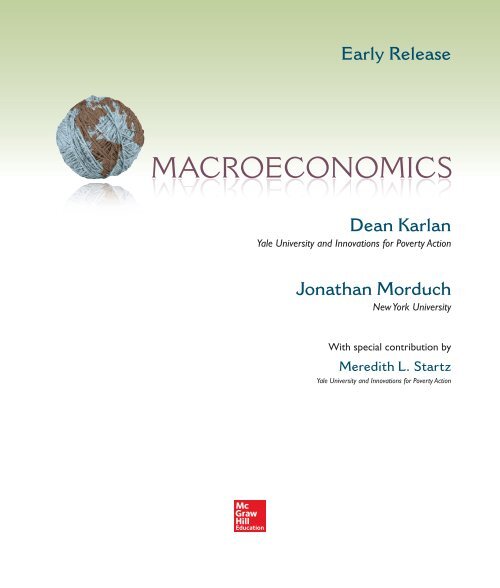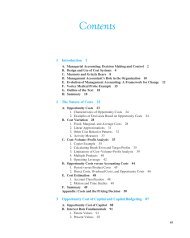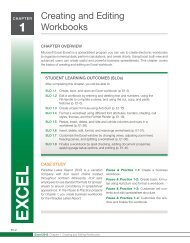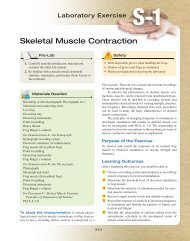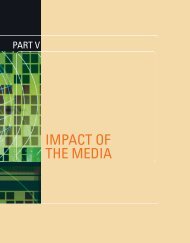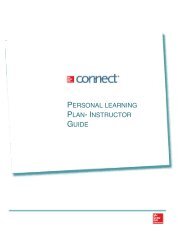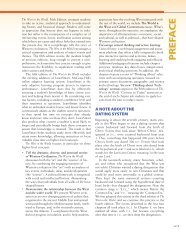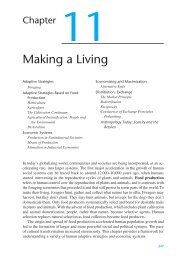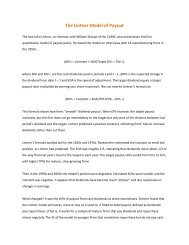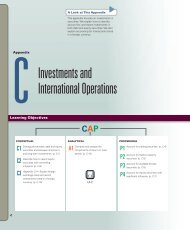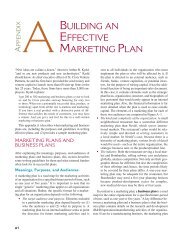MACROECONOMICS - McGraw-Hill
MACROECONOMICS - McGraw-Hill
MACROECONOMICS - McGraw-Hill
You also want an ePaper? Increase the reach of your titles
YUMPU automatically turns print PDFs into web optimized ePapers that Google loves.
Early Release<br />
<strong>MACROECONOMICS</strong><br />
Dean Karlan<br />
Yale University and Innovations for Poverty Action<br />
Jonathan Morduch<br />
New York University<br />
With special contribution by<br />
Meredith L. Startz<br />
Yale University and Innovations for Poverty Action
<strong>MACROECONOMICS</strong>: EARLY RELEASE<br />
Published by <strong>McGraw</strong>-<strong>Hill</strong> Education, 2 Penn Plaza, New York, NY 10121. Copyright © 2014 by<br />
<strong>McGraw</strong>-<strong>Hill</strong> Education. All rights reserved. Printed in the United States of America. No part of this<br />
publication may be reproduced or distributed in any form or by any means, or stored in a database or<br />
retrieval system, without the prior written consent of <strong>McGraw</strong>-<strong>Hill</strong> Education, including, but not limited<br />
to, in any network or other electronic storage or transmission, or broadcast for distance learning.<br />
Some ancillaries, including electronic and print components, may not be available to customers<br />
outside the United States.<br />
This book is printed on acid-free paper.<br />
1 2 3 4 5 6 7 8 9 0 DOW/DOW 1 0 9 8 7 6 5 4 3<br />
ISBN 978-0-07-811181-5<br />
MHID 0-07-811181-1<br />
Senior Vice President, Products & Markets: Kurt L. Strand<br />
Vice President, Content Production & Technology Services: Kimberly Meriwether David<br />
Managing Director: Douglas Reiner<br />
Executive Director of Development: Ann Torbert<br />
Development Editor: Alyssa Lincoln<br />
Director of Digital Content: Douglas A. Ruby<br />
Marketing Manager: Katie White Hoenicke<br />
Content Project Manager: Lori Koetters<br />
Content Project Manager: Marianne L. Musni<br />
Buyer II: Debra R. Sylvester<br />
Design: Matt Diamond<br />
Cover Image: (c) Shutterstock<br />
Lead Content Licensing Specialist: Keri Johnson<br />
Typeface: 10/12 Palatino Roman<br />
Compositor: Laserwords Private Limited<br />
Printer: R. R. Donnelley<br />
All credits appearing on page or at the end of the book are considered to be an extension of the<br />
copyright page.<br />
Library of Congress Cataloging-in-Publication Data<br />
Karlan, Dean S.<br />
Macroeconomics/Dean Karlan, Yale University and Innovations for Poverty Action, Jonathan<br />
Morduch, New York University; with special contribution by Meredith L. Startz, Yale University<br />
and Innovations for Poverty Action.—First edition.<br />
pages cm.—(The <strong>McGraw</strong>-<strong>Hill</strong> series economics)<br />
Includes bibliographical references and index.<br />
ISBN 978-0-07-733264-8 (alk. paper)—ISBN 0-07-733264-4 (alk. paper)<br />
1. Macroeconomics—Textbooks. I. Morduch, Jonathan. II. Startz, Meredith L. III. Title.<br />
HB172.5.K374 2014<br />
339—dc23<br />
2013019262<br />
The Internet addresses listed in the text were accurate at the time of publication. The inclusion of a<br />
website does not indicate an endorsement by the authors or <strong>McGraw</strong>-<strong>Hill</strong> Education, and <strong>McGraw</strong>-<br />
<strong>Hill</strong> Education does not guarantee the accuracy of the information presented at these sites.<br />
www.mhhe.com
about the authors<br />
Dean<br />
Karlan<br />
Dean Karlan is Professor of<br />
Economics at Yale University<br />
and President and Founder<br />
of Innovations for Poverty<br />
Action (IPA). Dean started<br />
IPA in 2002, with two aims:<br />
to help learn what works<br />
and what does not in the fight against poverty and other<br />
social problems around the world, and then to implement<br />
successful ideas at scale. IPA now works in over 45 countries,<br />
with 800 employees around the world. Dean’s personal<br />
research focuses on using field experiments to learn<br />
more about how microfinance works and how to make it<br />
work better. His research uses ideas from behavioral economics,<br />
and also covers fundraising, voting, health, and<br />
education. In recent work, for example, he has studied<br />
the impact of microcredit on the lives of the poor, and has<br />
worked to create better financial products in the United<br />
States to help people manage debt. Dean is also President<br />
and co-Founder of stickK.com, a start-up that helps people<br />
use commitment contracts to achieve personal goals,<br />
such as losing weight or completing a problem set on<br />
time. Dean is a Sloan Foundation Research Fellow, and<br />
in 2007 was awarded a Presidential Early Career Award<br />
for Scientists and Engineers. He is co-editor of the Journal<br />
of Development Economics, and on the editorial boards<br />
of American Economic Journal: Applied Economics, Journal of<br />
Economic Literature, Quantitative Economics, and Journal of<br />
Globalization and Development. He holds a B.A. from University<br />
of Virginia, an M.P.P. and M.B.A. from University<br />
of Chicago, and a Ph.D. in Economics from M.I.T. In 2011,<br />
he co-authored More Than Good Intentions: Improving the<br />
Ways the World’s Poor Borrow, Save, Farm, Learn, and Stay<br />
Healthy.<br />
Jonathan<br />
Morduch<br />
Jonathan Morduch is Professor<br />
of Public Policy and<br />
Economics at New York<br />
University’s Wagner Graduate<br />
School of Public Service.<br />
Jonathan focuses on<br />
innovations that expand the<br />
frontiers of finance and how financial markets shape<br />
economic growth and inequality. Jonathan has lived and<br />
worked in Asia, but his newest study follows families in<br />
California, Mississippi, Ohio, Kentucky, and New York<br />
as they cope with economic ups and downs over a year.<br />
The new study jumps off from ideas in Portfolios of the<br />
Poor: How the World’s Poor Live on $2 a Day (Princeton<br />
University Press, 2009) which he co-authored and which<br />
describes how families in Bangladesh, India, and South<br />
Africa devise ways to make it through a year living on<br />
$2 a day or less. Jonathan’s research on financial markets<br />
is collected in The Economics of Microfinance and Banking<br />
the World, both published by MIT Press. At NYU, Jonathan<br />
is Executive Director of the Financial Access Initiative,<br />
a center that supports research on extending access<br />
to finance in low-income communities. Jonathan’s ideas<br />
have also shaped policy through work with the United<br />
Nations, World Bank, and other international organizations.<br />
In 2009, the Free University of Brussels awarded<br />
Jonathan an honorary doctorate to recognize his work<br />
on microfinance. He holds a B.A. from Brown and Ph.D.<br />
from Harvard, both in Economics.<br />
Karlan and Morduch first met in 2001 and have been friends and colleagues ever since. Before writing this text,<br />
they collaborated on research on financial institutions. Together, they’ve written about new directions in financial<br />
access for the middle class and poor, and in Peru they set up a laboratory to study incentives in financial contracts<br />
for loans to women to start small enterprises. In 2006, together with Sendhil Mullainathan, they started the<br />
Financial Access Initiative, a center dedicated to expanding knowledge about financial solutions for the half of<br />
the world’s adults who lack access to banks. This text reflects their shared passion for using economics to help<br />
solve problems, both in everyday life and in the broader world.
ief contents<br />
Thinking Like an Economist<br />
PART 1 The Power of Economics 1<br />
1 Economics and Life 3<br />
2 Specialization and Exchange 25<br />
PART 2 Supply and Demand 47<br />
3 Markets 49<br />
4 Elasticity 77<br />
5 Efficiency 99<br />
6 Government Intervention 123<br />
Macroeconomics: Thinking Like<br />
a Macroeconomist<br />
PART 3 The Data of Macroeconomics 153<br />
7 Measuring the Wealth of Nations 155<br />
8 The Cost of Living 187<br />
PART 5 The Economy in the Short<br />
Run 259<br />
11 Aggregate Demand and Aggregate Supply 261<br />
12 Fiscal Policy and Public Finance 291<br />
PART 6 The Financial System<br />
and Institutions 317<br />
13 The Basics of Finance 319<br />
14 Money and the Monetary System 351<br />
15 Inflation 381<br />
16 Financial Crisis 413<br />
PART 7 International Policy Issues 437<br />
17 Open-market Macroeconomics 439<br />
18 Development Economics 473<br />
PART 4 Economic Growth<br />
and Unemployment 211<br />
9 Economic Growth 213<br />
10 Unemployment and the Demand for Labor 235<br />
iv
letter from the authors<br />
Dear Reader,<br />
Thank you for using the Early Release volume of our first edition. One of the best<br />
parts of writing this text has been getting to spend time with instructors across the<br />
country. We’ve been inspired by their creativity and passion and have learned from<br />
their pedagogical ideas. Through the course of our work, we were excited and flattered<br />
by requests to use the product as soon as possible. This Early Release volume<br />
provides a way to utilize the content before the final product is available. We appreciate<br />
you engaging with our content in this way.<br />
One of the questions we often ask instructors we meet is why they originally<br />
became interested in economics. A common response, which we share, is an attraction<br />
to the logic and power of economics as a social science. We also often hear<br />
instructors describe something slightly different: the way that economics appealed<br />
to them as a tool for making sense of life’s complexities, whether in business, politics,<br />
or daily life. We wrote this book to give instructors a way to share both of those<br />
ways that economics matters.<br />
We offer this text as a resource for professors who want to keep their students<br />
engaged and who have been seeking to deliver core economic concepts along with<br />
an introduction to important new ideas in economic thought. We designed the text<br />
to help students see economics as a common thread that enables us to understand,<br />
analyze, and solve problems in our local communities and around the world.<br />
We achieve these goals through three innovative commitments. We promise to:<br />
• Show how economics can solve problems. This text will engage students by<br />
approaching economics as a way of explaining real people and decisions, and by<br />
providing a set of tools that can serve to solve many different types of problems.<br />
We show students that economics can make the world a better place, while challenging<br />
them to reach their own conclusions about what “better” really means.<br />
• Teach principles as analytic tools for dealing with real situations. The text is<br />
centered on concrete examples and issues. Applications come first, reinforcing the<br />
relevance of the tools that students acquire. Engaging empirical cases are interspersed<br />
throughout the content. The applications open up puzzles, anomalies,<br />
and possibilities that basic economic principles help explain. The aim is, first and<br />
foremost, to ensure that students gain an intuitive grasp of basic ideas.<br />
• Focus on what matters to students. Students live in a digital, globalized world.<br />
We recognize that they are knowledgeable and care about both local and international<br />
issues. The text takes a global perspective, with the United States as a<br />
leading example. We remain faithful to the core principles of economics, but we<br />
seek to share with students some of the ways that new ideas are expanding the<br />
“basics” of economic theory. We recognize and explain the rise of game theory,<br />
behavioral economics, and experimental and empirical approaches, in ways that<br />
matter to students.<br />
v
This text draws on our own experiences as academic economists, teachers, and<br />
policy advisors. We are based at large research universities, offering advice to<br />
NGOs, governments, international agencies, donors, and private firms. Much of<br />
our research involves figuring out how to improve the way real markets function.<br />
Working with partners in the United States and on six continents, we are involved<br />
in testing new economic ideas. This text draws on the spirit of that work, as well as<br />
similar research, taking students through the process of engaging with real problems,<br />
using analytical tools to devise solutions, and ultimately showing what works<br />
and why.<br />
The chapters in this text provide a foundation for considering important issues<br />
that students will confront in life. We hope that, in ways small and large, the tools<br />
they learn will help them think critically about their surroundings and live better<br />
lives.<br />
Dean Karlan<br />
Yale University<br />
Jonathan Morduch<br />
New York University<br />
vi


